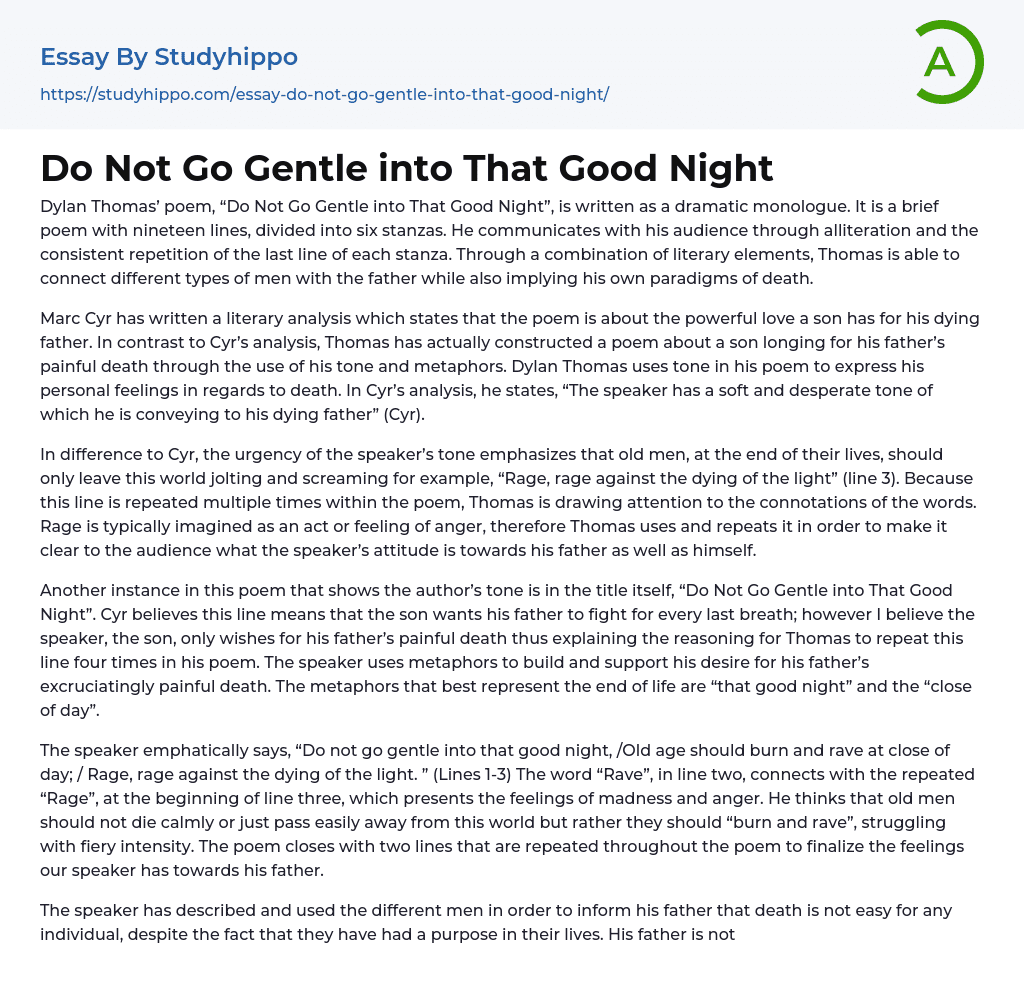Dylan Thomas’ poem, “Do Not Go Gentle into That Good Night”, is written as a dramatic monologue. It is a brief poem with nineteen lines, divided into six stanzas. He communicates with his audience through alliteration and the consistent repetition of the last line of each stanza. Through a combination of literary elements, Thomas is able to connect different types of men with the father while also implying his own paradigms of death.
Marc Cyr has written a literary analysis which states that the poem is about the powerful love a son has for his dying father. In contrast to Cyr’s analysis, Thomas has actually constructed a poem about a son longing for his father’s painful death through the use of his tone and metaphors. Dylan Thomas uses tone in his poem to express his personal feelings in
...regards to death. In Cyr’s analysis, he states, “The speaker has a soft and desperate tone of which he is conveying to his dying father” (Cyr).
In difference to Cyr, the urgency of the speaker’s tone emphasizes that old men, at the end of their lives, should only leave this world jolting and screaming for example, “Rage, rage against the dying of the light” (line 3). Because this line is repeated multiple times within the poem, Thomas is drawing attention to the connotations of the words. Rage is typically imagined as an act or feeling of anger, therefore Thomas uses and repeats it in order to make it clear to the audience what the speaker’s attitude is towards his father as well as himself.
Another instance in this poem that shows the author’s tone is in the title itself, “Do
Not Go Gentle into That Good Night”. Cyr believes this line means that the son wants his father to fight for every last breath; however I believe the speaker, the son, only wishes for his father’s painful death thus explaining the reasoning for Thomas to repeat this line four times in his poem. The speaker uses metaphors to build and support his desire for his father’s excruciatingly painful death. The metaphors that best represent the end of life are “that good night” and the “close of day”.
The speaker emphatically says, “Do not go gentle into that good night, /Old age should burn and rave at close of day; / Rage, rage against the dying of the light. ” (Lines 1-3) The word “Rave”, in line two, connects with the repeated “Rage”, at the beginning of line three, which presents the feelings of madness and anger. He thinks that old men should not die calmly or just pass easily away from this world but rather they should “burn and rave”, struggling with fiery intensity. The poem closes with two lines that are repeated throughout the poem to finalize the feelings our speaker has towards his father.
The speaker has described and used the different men in order to inform his father that death is not easy for any individual, despite the fact that they have had a purpose in their lives. His father is not different than any of them; the father is dying, and the speaker repeatedly mentions the hope for an uncomfortable death for his dying father. “Do Not Go Gentle Into That Good Night,” conveys a message of craved violence through mere words as
a way to stress how death is sorrowful in real life. Thomas encounters a way to flash images through the readers’ minds along with using different poetic devices.
Over and over he inspires malicious demise. The complex personality of the son is never explained in depth, however, it is only stated that the son wishes for his father’s passing. The identities of all four men resemble each life stage of his father and each life ends in the same agonizing death for them, the same as his father. This poem is emotional and touching as it reveals the viewpoint of the narrator about his father’s end of life. The rhythmic beat of the combination of metaphors, tone, and consistent repetitions brings the tune of desire for a miserable death.
- Boo Radley essays
- Genesis essays
- Richard iii essays
- Alice in Wonderland essays
- On the road essays
- Ozymandias essays
- The Nightingale essays
- Holden Caulfield essays
- Animal Farm essays
- 1984 essays
- A Hanging essays
- Shooting An Elephant essays
- A Tale Of Two Cities essays
- Adventures Of Huckleberry Finn essays
- Arthur Conan Doyle essays
- Brave New World essays
- Characters In Hamlet essays
- Characters In Romeo And Juliet essays
- Desdemona essays
- Diary Of A Wimpy Kid essays
- First-Person Narrative essays
- Frankenstein essays
- Heart Of Darkness essays
- Jane Eyre essays
- Jay Gatsby essays
- King Duncan essays
- Librarian essays
- Little Red Riding Hood essays
- Lord Of The Flies essays
- Silas Marner essays
- The Cask Of Amontillado essays
- The Catcher In The Rye essays
- The Crucible essays
- The Handmaid's Tale essays
- The Reader essays
- Virgil essays
- Wuthering Heights essays
- Candide essays
- Castle essays
- J. D. Salinger essays
- Ulysses essays
- Ethan Frome essays
- In Cold Blood essays
- Outliers essays
- Tuesdays With Morrie essays
- The Art of War essays
- Wife of Bath essays
- Huckleberry Finn essays
- The Lady With The Dog essays
- Great Expectations essays




